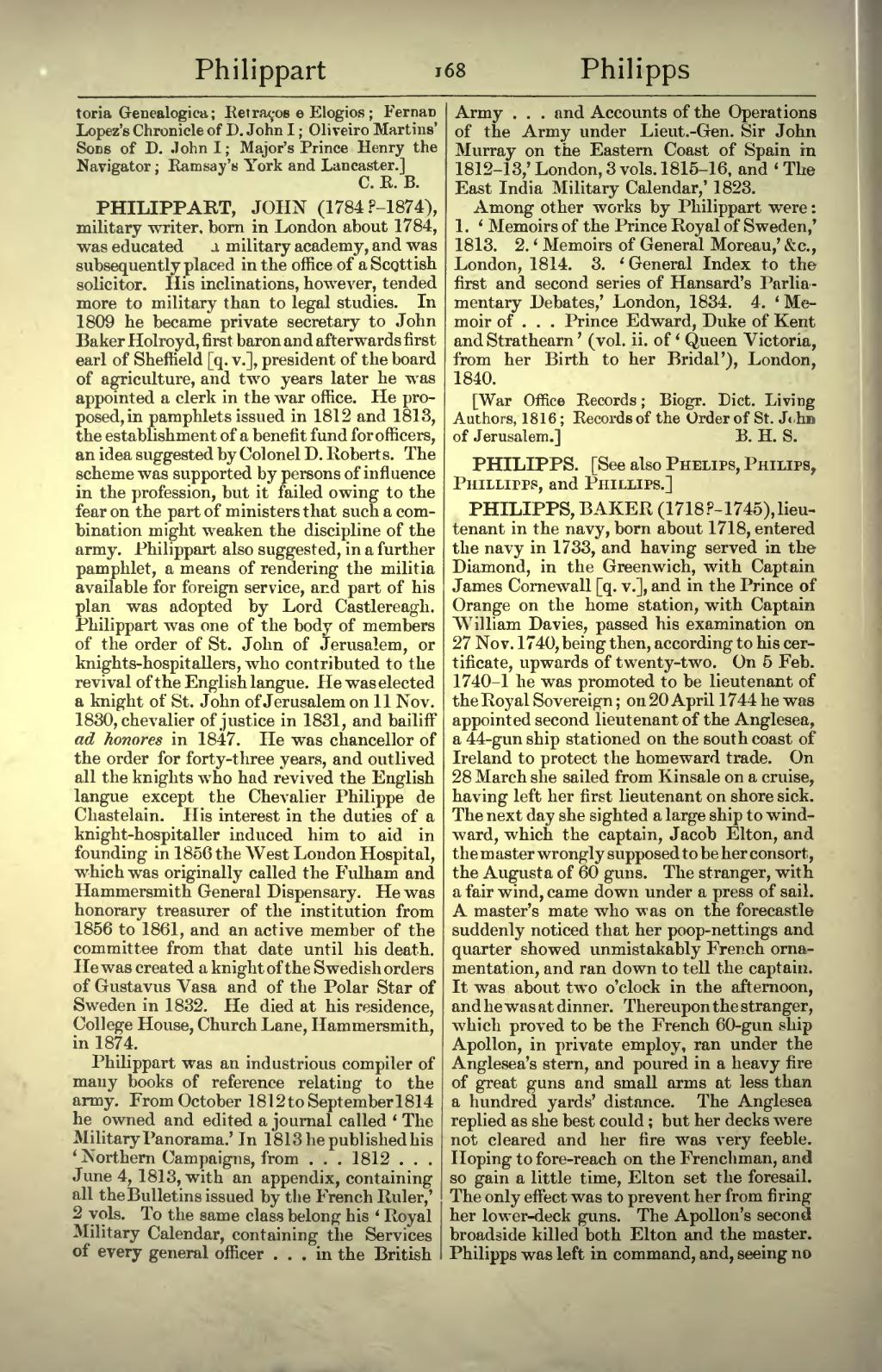toria Genealogica; Retraços e Elogios; Fernan Lopez's Chronicle of D. John I; Oliveiro Martins' Sons of D. John I; Major's Prince Henry the Navigator; Ramsay's York and Lancaster.]
PHILIPPART, JOHN (1784?–1874), military writer, born in London about 1784, was educated at a military academy, and was subsequently placed in the office of a Scottish solicitor. His inclinations, however, tended more to military than to legal studies. In 1809 he became private secretary to John Baker Holroyd, first baron and afterwards first earl of Sheffield [q. v.], president of the board of agriculture, and two years later he was appointed a clerk in the war office. He proposed, in pamphlets issued in 1812 and 1813, the establishment of a benefit fund for officers, an idea suggested by Colonel D. Roberts. The scheme was supported by persons of influence in the profession, but it failed owing to the fear on the part of ministers that such a combination might weaken the discipline of the army. Philippart also suggested, in a further pamphlet, a means of rendering the militia available for foreign service, and part of his plan was adopted by Lord Castlereagh. Philippart was one of the body of members of the order of St. John of Jerusalem, or knights-hospitallers, who contributed to the revival of the English langue. He was elected a knight of St. John of Jerusalem on 11 Nov. 1830, chevalier of justice in 1831, and bailiff ad honores in 1847. He was chancellor of the order for forty-three years, and outlived all the knights who had revived the English langue except the Chevalier Philippe de Chastelain. His interest in the duties of a knight-hospitaller induced him to aid in founding in 1856 the West London Hospital, which was originally called the Fulham and Hammersmith General Dispensary. He was honorary treasurer of the institution from 1856 to 1861, and an active member of the committee from that date until his death. He was created a knight of the Swedish orders of Gustavus Vasa and of the Polar Star of Sweden in 1832. He died at his residence, College House, Church Lane, Hammersmith, in 1874.
Philippart was an industrious compiler of many books of reference relating to the army. From October 1812 to September 1814 he owned and edited a journal called ‘The Military Panorama.’ In 1813 he published his ‘Northern Campaigns, from … 1812 … June 4, 1813, with an appendix, containing all the Bulletins issued by the French Ruler,’ 2 vols. To the same class belong his ‘Royal Military Calendar, containing the Services of every general officer … in the British Army … and Accounts of the Operations of the Army under Lieut.-Gen. Sir John Murray on the Eastern Coast of Spain in 1812–13,’ London, 3 vols. 1815–16, and ‘The East India Military Calendar,’ 1823
Among other works by Philippart were: 1. ‘Memoirs of the Prince Royal of Sweden,’ 1813. 2. ‘Memoirs of General Moreau,’ &c., London, 1814. 3. ‘General Index to the first and second series of Hansard's Parliamentary Debates,’ London, 1834. 4. ‘Memoir of … Prince Edward, Duke of Kent and Strathearn’ (vol. ii. of ‘Queen Victoria, from her Birth to her Bridal’), London, 1840.
[War Office Records; Biogr. Dict. Living Authors, 1816; Records of the Order of St. John of Jerusalem.]
PHILIPPS. [See also Phelips, Philips, Phillipps, and Phillips.]
PHILIPPS, BAKER (1718?–1745), lieutenant in the navy, born about 1718, entered the navy in 1733, and having served in the Diamond, in the Greenwich, with Captain James Cornewall [q. v.], and in the Prince of Orange on the home station, with Captain William Davies, passed his examination on 27 Nov. 1740, being then, according to his certificate, upwards of twenty-two. On 5 Feb. 1740–1 he was promoted to be lieutenant of the Royal Sovereign; on 20 April 1744 he was appointed second lieutenant of the Anglesea, a 44-gun ship stationed on the south coast of Ireland to protect the homeward trade. On 28 March she sailed from Kinsale on a cruise, having left her first lieutenant on shore sick. The next day she sighted a large ship to windward, which the captain, Jacob Elton, and the master wrongly supposed to be her consort, the Augusta of 60 guns. The stranger, with a fair wind, came down under a press of sail. A master's mate who was on the forecastle suddenly noticed that her poop-nettings and quarter showed unmistakably French ornamentation, and ran down to tell the captain. It was about two o'clock in the afternoon, and he was at dinner. Thereupon the stranger, which proved to be the French 60-gun ship Apollon, in private employ, ran under the Anglesea's stern, and poured in a heavy fire of great guns and small arms at less than a hundred yards' distance. The Anglesea replied as she best could; but her decks were not cleared and her fire was very feeble. Hoping to fore-reach on the Frenchman, and so gain a little time, Elton set the foresail. The only effect was to prevent her from firing her lower-deck guns. The Apollon's second broadside killed both Elton and the master. Philipps was left in command, and, seeing no
